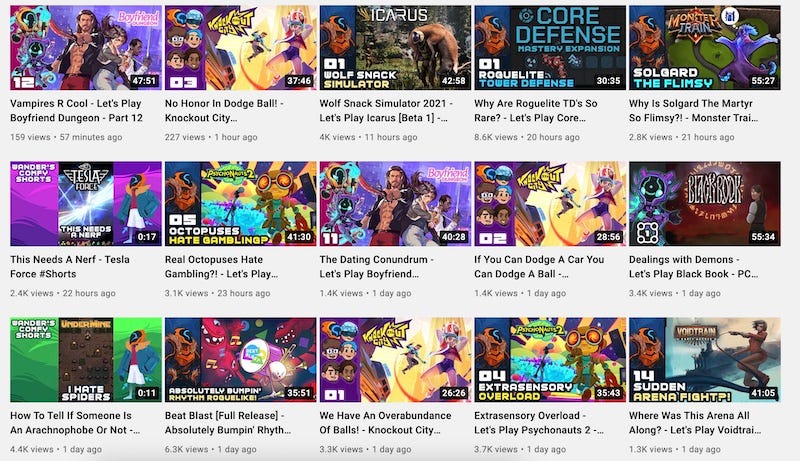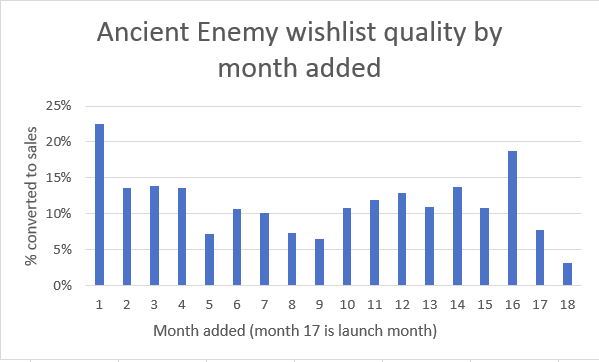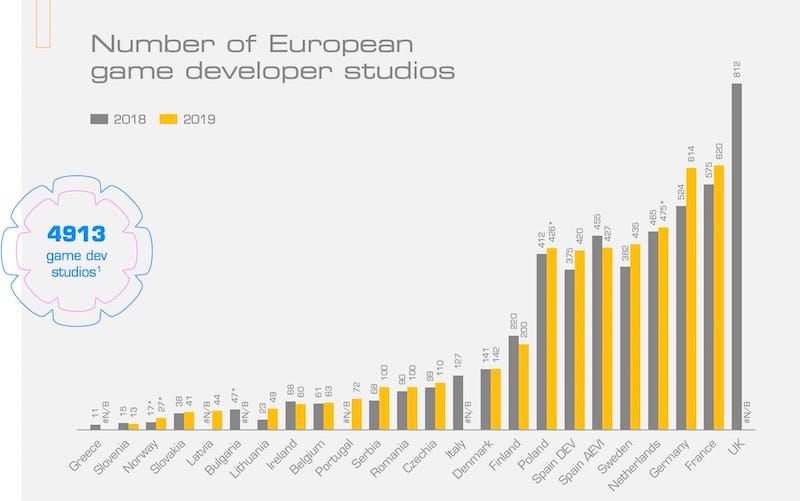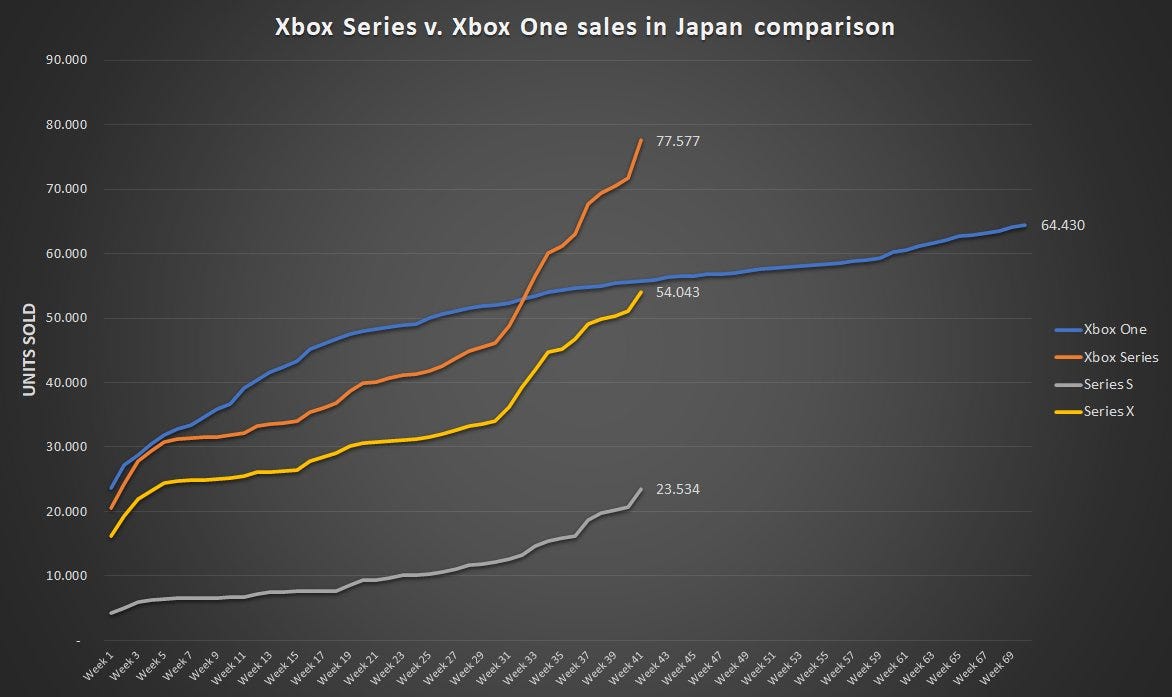Is your streamer game discovery strategy 'on point'?
Some tips, plus Steam wishlist conversions and much more.
[The GameDiscoverCo game discovery newsletter is written by ‘how people find your game’ expert & GameDiscoverCo founder Simon Carless, and is a regular look at how people discover and buy video games in the 2020s.]
Welcome back, discovery cosmonauts, to the wooorld of tomorrow! In this brave new era, you still have to worry about a whole bunch of things. But all of your game discovery worries are telescoped down into a concentrated email you receive two or three times a week. It’s for your health.
OK, that’s is a really bad pitch for this newsletter. But before we get started, wanted to thank everyone who’s contributed to our new Steam game data survey so far. We have over 50 responses, but would love to get closer to 100 - so if you released a Steam game in 2019, 2020, or 2021, spend 5 minutes filling it in, and we’ll share results soon.
[Thanks to new members of our GameDiscoverCo Plus paid subscription - only $12 a month if you sign up for a year, includes an info-filled Discord, a data-exportable Steam Hype back-end for ranking/comparing unreleased games, our new eBook, & lots more - join them!]
How do you find the perfect streamer for your game?
Look, folks, games are a visual medium. So it shouldn’t be surprising that for many (but not all) games, YouTubers and Twitch streamers can be a vital discovery tool.
I’ve been doing some (minor!) advising to Luke Schneider of Radiangames as he preps his ‘destroy ‘em up’ Instruments Of Destruction, for example. And he’s already seeing the positive effects of giving early alphas to streamers such as the 975k subscriber Raptor (see above).
But what are best practices for video game discovery and streamers? For me, it’s not solely about using large automated services to request or send out keys (though that can be helpful too!), and the ecosystem is actually surprisingly large and complex.
When we talked about this on the GameDiscoverCo Plus Discord recently, there was some very useful insight from Adam Lieb of Gamesight, whose company actually has an influencer discovery database (but is keen to note that his advice is completely platform-independent - which it is!) So here’s a brief chat with Adam on best practices:
What's the best approach to targeting streamers with free keys that you've seen? (Should it be a multi-pronged approach?)
The best approach is multi-faceted. Creators receive multiple emails each day and often don’t have time to review every free game offer. While it’s a nice gesture, if there’s not a paid opportunity tied to it, it tends to be overlooked.
There are a few things that can help increase awareness and interest for free keys that every developer should consider.
Community managers or official social accounts: The biggest problem with free keys is often the lack of awareness. For several creators, their business email is managed by an agency or a talent manager. That means a creator may not ever even see the offer. To combat this, developers and community managers should be making resources like free key programs and partnerships available using platforms like Twitter.
Targeted outreach: For acceptance it is critical to ensure that you are reaching out to creators who traditionally enjoy games like the one we are advertising. Firing a generic email to the top 50 streamers is unlikely to yield any results.
Being intentional: Who are your creators? Do they represent the community you want to have playing your game? What does the body of your email look like? What information does it share about your game? Does it explain why you chose this person to preview your game? Authenticity and transparency goes a long way. No one just wants to be another address off a mass email list.
Is it good enough to just search by specific games that streamers have played, or are there other factors?
An important metric to pair with games streamers have played is viewership percent change based on game/genre. If a streamer has played a game similar to yours, but half her audience tuned out when she turned it on, she is likely not a great fit for your game as she knows (or should know) it is going to cost her half of her audience.
On the other hand, if you find a creator who has built a community of viewers who love games in your genre and they receive steady or growing viewership when they stream those games, that is likely to be a great match.
When we look at performance (sales driven by individual creators) the number one metric that matters is what percent of that creator’s audience watches games like your game. The audience is what really matters. A creator may absolutely love your game but if his audience isn’t a fan of the genre it won’t convert into revenue. Focus on target audiences within your game genre if you care about driving sales.
How personalized do you think you should get with pitches to streamers? (Are too generic emails a turn-off?)
This depends on how much streamers see themselves benefitting from the sponsorships. If you’re asking influencers to make content about your game for free, you’ll have better success with personalized pitches that emphasize other benefits they’ll receive from the partnership (such as increased channel visibility playing highly-anticipated games before they’re released, or free access to a game that aligns with the tastes of their audience).
Brand matters a lot here as well. If the creator has heard of your game (make sure to include this in the subject line of any outreach), studio, or publisher the odds that they’ll keep reading increase dramatically.
(As an exception, small content creators getting paid a fair, flat rate for sponsored videos don’t mind generic emails in the initial stages of outreach.)
If you're thinking of paying streamers to stream your game, do you use a similar quality sorting methodology, or are there other things to bear in mind?
Target the audience, not the creator. At the end of the day you are paying to get your game in front of those audiences, not just to have a creator play your game. The number one stat we look at is “percentage of audience in target” where we look at what other games a creator’s audience engages with and whether or not those are competitive/similar games. Spray and pray platforms can’t provide you with that insight.
Ignore vanity metrics (followers, subscribers, total views) and focus on what actually matters:
How influential is this creator in the creator community for my game genre?
How loyal is this creator’s audience to this creator versus how loyal are they to that creator’s primary game?
What is the anticipated viewership drop off for my game?
What is the game concentration for this creator (are they ‘variety’, or focused on just one game)?
Finally, prioritize diversity of creators. You don’t have just one type of player who will play your game, so you shouldn’t have just one type of content creator being sponsored either.
What are the biggest misunderstandings around how devs interact with streamers, especially for larger games?
There are misconceptions that developers don’t listen or care about streamer/player input. We have found the opposite to be true, in the majority of cases. Sometimes a few bad apples spoil the bunch. Most developers care deeply about what creators think, if they’re having fun, and how they can continue to improve their game.
Many times, a healthy streamer community facilitates a healthy game community. Depending on the type of game, a good amount of the consumer population often equates game health with Twitch or YouTube stream numbers, especially for multiplayer games.
As such, it’s generally in a developer’s best interest to invest in their creator community. There’s an importance for developers to maintain cordial relations with their top creators in order to maintain a healthy overall game population.
This includes two-way communication, understanding, and transparency from both sides. We can see many instances where developers are quick to rectify game issues that are raised by larger creators, showcasing a healthy respect for both their streamer and in-game communities.
Follow-up: Steam wishlist conversions by month?
We had a couple of questions about one aspect of The Last Spell’s developer comments from earlier this month that I thought I’d better follow up on. People were confused about where the ‘% of converted Steam wishlists by month’ stat came from for the game.
We covered this back in June 2020, and I realized it was worth presenting again. Above is Jake Birkett’s graph for Ancient Enemy, for example. Basically, if you want to understand your ‘wishlist quality by age’, you can indeed do this in Steam - it’s just via a slightly convoluted method.
So, if you want to know post-release if wishlists added 5 months after Steam page launch convert as well - in aggregate - as one added 12 months after release, you can follow this document (PDF link), with Steam back end instructions put together by Alina Cebula from Brave At Night (Yes, Your Grace; Mind Scanners).
A couple of specific thoughts on this. Firstly, we often see results from games that performed ‘reliably’ or decently. But I want to see data from a wider variety of results - especially from people who had ‘disappointing’ launches compared to Steam launch wishlist #s. (Send them over - can be anonymous if you need to!)
And secondly, I’m wondering if all subgenres have radically different wishlist conversion rates, and it’s only somewhat affected by wishlist quality. For example, is ‘cute 3D platformer’ a median 5% conversion rate on Steam, and ‘chill city builder’ a median 15% conversion rate? I don’t know how the heck we work this out… but more data is good, haha.
The game discovery news round-up..
Well, onwards to the round-up, which has a lot of meat to it this week, thanks to the amount of stuff going on in the industry. Some of it on the disturbing side of things *eyes Chinese government*.
BTW, we do have some things to say about the latest Steam refund blow-up. But we’re going to leave it to Wednesday’s newsletter to gather a little more data and context, since - as always - it’s more complex than it looks. Anyhow, onwards to the info:
Guessing you’ve seen it already, but “online gamers under the age of 18 will only be allowed to play for an hour on Fridays, weekends and holidays, China's video game regulator has said.” The South China Morning Post has a great English-language overview - posted before this latest move - of the Chinese gov’s “love-hate relationship” with games. Clearly, it’s hardly the worst of its restrictive policies, but with China such a big game market, everyone should be looking on closely.
My buddies at (formerly!) Gamasutra have launched GameDeveloper.com, and one of the notable articles on the new site is a postmortem of Loop Hero from the devs. What I took away: it started as a jam demo with obvious ‘hook’, which is a great starting point (see: Baba Is You), and the team regretted a simultaneous Mac and Linux release, among other things.
So yes, Apple settled a lawsuit brought by some iOS app devs, including a $100 million payout and a rule ‘clarification’ that “iOS developers can contact their customers… using information collected inside their apps to tell them about payment options outside the App Store.” Most reaction has been that it’s a fig leaf covering quarter-step, but this blog post makes an enthusiastic pitch that “incentivizing out-of-game activities” may be something F2P mobile games will be trying soon.
Microlinks: if you want to know trending data or revenue info for Roblox games, there’s BloxBunny.com; the Nintendo eShop is shortly launching in Argentina, Colombia, Chile and Peru, after a Brazilian launch late last year; why doesn’t China have a video game rating system?
We’ve been getting a few questions on how to keep up with online events & festivals: wanted to highlight the ‘festival submissions’ tracker on the Indie Houses website (formerly Akupara’s); but also Game Conference Guide, which has less on deadlines but many more events. Any other good ones? Ping us!
Over on GI, the 11 Bit Studio crew documents a Steam publisher sale using bundles as the main hook, an interesting idea I haven’t seen done much. They note: “we sold nearly a million units of games and DLCs combined in a week” - looks like there were about 20 SKUs sold in the bundle, which gives you a good idea, and also noted a disadvantage of going this way: “Those who had previously wishlisted our games weren't notified about the whole bundle idea, but only about a discount on the particular product.” Still, intriguing.
A couple of notable European reports - ISFE’s European video game industry in 2020 report includes a bunch of interesting infographics on the state of games (a bit like the ESA’s U.S. report), and this EGDF report using 2019 data (but just released) has some interesting attempts to quantify the number of game devs per country - see infographic above.
Microlinks, Pt. 2: why do video games ‘get old’ so swiftly vs. other mediums?; a neat interview with Axios’ Stephen Totilo on how reporting on games has changed in the last decade; you should be keeping half an eye on AR, like Facebook’s Project Aria glasses, just in case.
Finally, the Game Data Library Twitter account, billed as “the largest collection of Japanese game sales data on the internet”, has revealed a funny - if minor - milestone:
Specifically, as they explain: “The original Xbox One model sold around 72k units in Japan total. This week, the combined sales of both Xbox Series SKUs surpassed its total sales, with the Series X being barely behind launches aligned.”
Honestly, Nintendo Switch and smartphone games have dominated both PlayStation and Xbox in Japan for a number of years. But PlayStation 4 sold 9 million units there, and even PlayStation 5 is almost at 1 million units LTD in Japan, I believe.
So we’re still at Gates x cheeseburger++ levels for Xbox consoles in Japan. But I don’t think Microsoft minds much - they have plenty of other global expansion plans in mind around Game Pass. See you Wednesday!
[We’re GameDiscoverCo, a new agency based around one simple issue: how do players find, buy and enjoy your premium PC or console game? You can subscribe to GameDiscoverCo Plus to get access to exclusive newsletters, interactive daily rankings of every unreleased Steam game, and lots more besides.]




